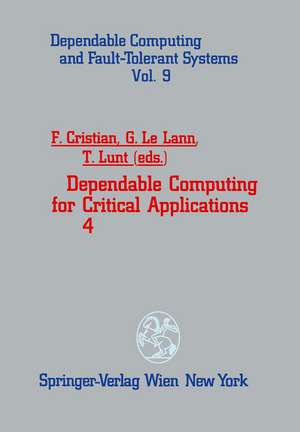Dependable Computing for Critical Applications 4: Dependable Computing and Fault-Tolerant Systems, cartea 9
Editat de Flaviu Cristian, Gerard LeLann, Teresa Lunten Limba Engleză Paperback – 12 feb 2012
Preț: 337.19 lei
Preț vechi: 421.48 lei
-20% Nou
Puncte Express: 506
Preț estimativ în valută:
64.53€ • 68.08$ • 53.78£
64.53€ • 68.08$ • 53.78£
Carte tipărită la comandă
Livrare economică 03-17 ianuarie 25
Preluare comenzi: 021 569.72.76
Specificații
ISBN-13: 9783709193983
ISBN-10: 3709193982
Pagini: 499
Ilustrații: VIII, 499 p.
Dimensiuni: 170 x 244 x 30 mm
Greutate: 0.82 kg
Ediția:Softcover reprint of the original 1st ed. 1995
Editura: SPRINGER VIENNA
Colecția Springer
Seria Dependable Computing and Fault-Tolerant Systems
Locul publicării:Vienna, Austria
ISBN-10: 3709193982
Pagini: 499
Ilustrații: VIII, 499 p.
Dimensiuni: 170 x 244 x 30 mm
Greutate: 0.82 kg
Ediția:Softcover reprint of the original 1st ed. 1995
Editura: SPRINGER VIENNA
Colecția Springer
Seria Dependable Computing and Fault-Tolerant Systems
Locul publicării:Vienna, Austria
Public țintă
ResearchCuprins
Formal Methods for Critical Systems.- On Doubly Guarded Multiprocessor Control System Design.- Using Data Consistency Assumptions to Show System Safety.- Panel Session: Formal Methods for Safety in Critical Systems.- Are Formal Methods Ready for Dependable Systems?.- Industrial Use of Formal Methods.- Formal Methods for Safety in Critical Systems.- Can We Rely on Formal Methods?.- A Role for Formal Methodists.- Combining the Fault-Tolerance, Security and Real-Time Aspects of Computing.- Toward a Multilevel-Secure, Best-Effort Real-Time Scheduler.- Fault-Detecting Network Membership Protocols for Unknown Topologies.- Secure Systems.- Denial of Service: A Perspective.- Reasoning About Message Integrity.- On the Security Effectiveness of Cryptographic Protocols.- Assessment of Dependability.- Assessing the Dependability of Embedded Software Sytems Using the Dynamic Flowgraph Methodology.- On Managing Fault-Tolerant Design Risks.- Panel Session: Quantitative versus Quantitative Aspects of Security.- Qualitative vs. Quantitative Assessment of Security: A Panel Discussion.- A Fault Forecasting Approach for Operational Security Monitoring.- Measurement of Operational Security.- Quantitative Measures of Security.- The Feasibility of Quantitative Assessment of Security.- Quantitative Measures vs. Countermeasures.- Basic Problems in Distributed Fault-Tolerant Systems.- Continual On-Line Diagnosis of Hybrid Faults.- The General Convergence Problem: A Unification of Synchronous Systems.- Specification and Verification of Distributed Protocols.- Specification and Verification of Behavioral Patterns in Distributed Computations.- Specification and Verification of an Atomic Broadcast Protocol.- Trace-Based Compositional Refinement of Fault-Tolerant Distributed Systems.- Design Techniques for Robustness.- A Modular Robust Binary Tree.- Secondary Storage Error Correction Utilizing the Inherent Redundancy of the Stored Data.- Panel Session: Common Techniques in Fault-Tolerance and Security.- Common Techniques in Fault-Tolerance and Security.- Improving Security by Fault-Tolerance.- The Need for A Failure Model for Security.- Reliability and Security.- Fault Tolerance and Security.- Common Techniques in Fault Tolerance and Security (and Performance!).- Real-Time Systems.- Upper and Lower Bounds on the Number of Faults a System Can Withstand Without Repairs.- Scheduling Fault Recovery Operations for Time-Critical Applications.- Evaluation of Dependability Aspects.- Effects of Physical Injection of Transient Faults on Control Flow and Evaluation of Some Software-Implemented Error Detection Techniques.- System-Level Reliability and Sensitivity Analyses for Three Fault-Tolerant System Architectures.- Improving Availability Bounds Using the Failure Distance Concept.



















